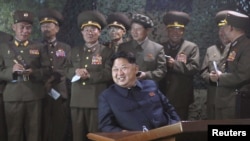North Korea released two South Korean citizens Wednesday who were apprehended after allegedly sneaking into the North last month. Pyongyang is making this seemingly conciliatory gesture right after indicating it is open to peace talks with Seoul, under certain conditions.
South Korea’s Unification Ministry spokeswoman Park Soo-jin confirmed Wednesday morning that North Korea repatriated two South Koreans that Pyongyang alleges illegally entered North Korea through the Chinese border May 11.
Park said at 10:15 am the government received two South Koreans, who entered North Korea at Panmunjom. The Panmunjom checkpoint is located in an abandoned village inside the demilitarized zone on the inter-Korean border.
The Unification Ministry offered no details on the motivation behind the prisoner release or about the couple’s identity but said the government will investigate the details of their entrance into North Korea.
There has been speculation that the two Koreans were Christian missionaries. Religious activities are restricted under the repressive and authoritarian North Korean regime. In the past, missionaries have been arrested for violating a ban on proselytizing or committing alleged crimes against the state. Some were allowed to return home after appeals by family or high-profile authorities from their home countries.
North Korea notified the South through the Red Cross Monday that they would release the couple. They did not provide any information on four other South Korean citizens being held by the North, including two that confessed to having spied for the South, and a 21-year-old New York University student who is a U.S. green card holder.
The release of the two South Koreans comes days after Pyongyang reiterated its willingness to reopen talks with South Korea, if Seoul agrees to suspend joint military drills with the United States and prohibit Korean activists from sending balloons full of anti-regime materials across the border.
Seoul has urged Pyongyang to engage in bilateral talks without any preconditions.
These seemingly positive overtures from Pyongyang come at a low point in both inter-Korean relations and North Korea’s relations with the international community.
Pyongyang continues to pursue its nuclear weapons program and develop its offensive ballistic missile capability despite the imposition of U.N. and other international sanctions.
Six party talks, that include the two Koreas, the U.S., China, Japan and Russia, to end Pyongyang’s nuclear program for economic assistance, have been on hold since 2008.
Washington and Seoul require Pyongyang to take concrete actions to end its nuclear program before any new international negotiations can occur. They advocate increasing diplomatic pressure and sanctions on North Korea until the leadership complies.
At the international level, there seems little room for compromise with all sides locked into their positions.
But at the inter-Korean level, Kim Yong-hyun, a North Korean studies professor at Dongguk University, said Wednesday, the prisoner release may offer an opportunity for engagement.
He said the release does not by itself constitute progress between the two Koreas, but it can play a role as lubricating oil, which can help to resolve larger issues.
Professor Kim said Seoul should reciprocate in a positive way, such as ending economic sanctions that were imposed in 2010 after the sinking of a South Korean naval vessel. Seoul blamed Pyongyang for the attack but North Korea has denied any involvement. He also suggests that South Korea work more actively to resume reunions of families that were separated since the Korean War ended in the 1950s.
He said that with these combined efforts, trust between the governments of the two Koreas will be established.
The International Crisis Group also released a report this week that supports the “current containment and deterrence policy” against Pyongyang, but also urges “new channels of engagement that may further incremental change in North Korean society.”
It urges Seoul, Washington and its allies to support increased civil society activities, such as educational, cultural, artistic, musical, scientific and sports exchanges with the isolated North.
VOA Seoul Producer Youmi Kim contributed to this report.





